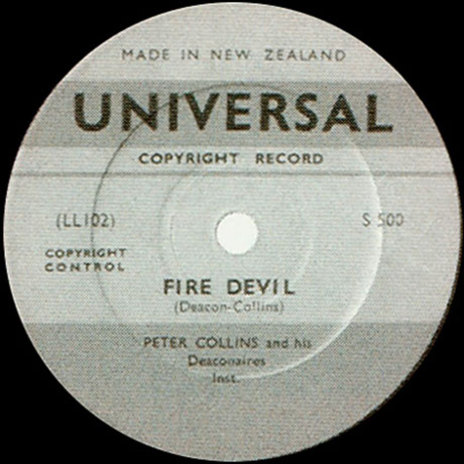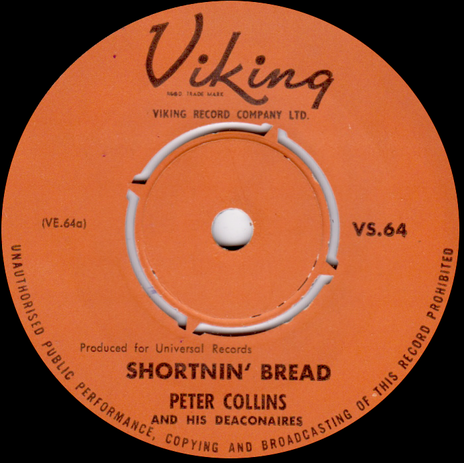Deakin soon take this rock and roll thing a bit further, forming a combo with a young would-be country singer and guitarist Peter Collins, a clerk by day with the local borough council. He wasn't Deakin's first choice as a band mate; the Englishman had been looking for another singer-guitarist he’d heard of, but stumbled across Collins instead.
They hit it off and set about forming an instrumental rock and roll act, Peter Collins and his Deaconaires, drafting in Noel Cameron on drums and bassist Trevor Hawke.
Kicking off with a regular monthly dance at the Railway Hall, the Deaconaires quickly hit a local vein, moving to the bigger Public Hall where they cranked up the dances to fortnightly, then weekly affairs, and sticking to Friday nights to avoid clashing with the old folks dances.
Word of the successful dance soon spread and the Deaconaires gained spots in nearby Christchurch playing with Max Merritt and The Meteors.
They didn't need those flying pennies now. They were all making good money – 12 quid a night. There was little competition for the teenage market in Ashburton, a town of 12,000 on the eastern edge of the vast Canterbury Plains, the clearing centre for the region's wool and grain. There was only a milk bar and movie theatre for teens to hang out in.
Word of the successful dance soon spread and the Deaconaires gained spots in nearby Christchurch playing with Max Merritt and The Meteors and Pat Neho's Saints at the Spencer Street Dance organised by Father Bob Considene, and in the next large centre south, Oamaru, at Club 100 and St Patrick's Hall.
Collins was also wearing his other hat, playing the area as a country singer after winning second place in a Joe Brown talent contest and gaining a spot on the show's South Island tour. Later, the Deaconaires backed local country star Garner Wayne on 'Blue Velvet Land'/ 'I Love The Land' for Viking Records.
Flush with their newfound popularity, the Deaconaires recorded a primitive take of two band originals at an Ashburton garage. On a whim, Jim Burgess and Norman Tait, owners of the local music store, sent the tapes to Bill McCaskill, owner of Universal Records. He liked them enough to request a record and steered them toward Christchurch's 3YA studios where the Deaconaires re-recorded the songs with Brian Reece, a 3YA technician.
'Diamond Lil', a Brian Deakin instrumental, sold well around Ashburton (two 500 unit pressings) and gained good airplay on Michael Woolf's ZB national commercial network show, but it was the flip side that really stunned.
'Fire Devil' is an untamed instrumental, heavily reliant on Collins' Bigsby vibrato for its raw, full-on sound. It stands up well, over 50 years later.
A second single followed, licensed by Universal to Viking Records, but whatever had sparked the devil's dance of their previous effort was conspicuously absent from 'TamiAmi' and 'Shortnin' Bread'.
Their final effort, recorded shortly after the Deaconaires break-up in 1963, was never released, as the band, buffeted by the onslaught of The Beatles and the pressures of Collins' job, succumbed to their own doubts.
To this day, that final recording – 'Secret Love' (a Doris Day hit) backed with '27 North Avenue', a Collins original featuring Auckland drummer Bob Milsom, remains unreleased, languishing in Collins' Ashburton home, together with his trusty Jansen Enforcer guitar and Jansen amp.

